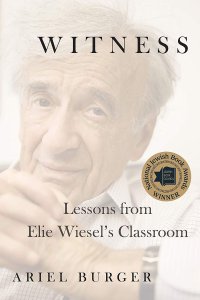By Annette Finley-Croswhite
Several weeks ago I received a phone call asking me if I could introduce a speaker at an off-campus event. I agreed, and before the evening was over I had been given a free copy of Ariel Burger's Witness: Lessons from Elie Wiesel's Classroom. I also got to meet Rabbi Burger, who had been Wiesel's student, mentee and friend for several decades. Burger's memoir interweaves Wiesel's story with his own, making us all privy to the life lessons that Wiesel taught. Witness won the National Jewish Book Award in biography in 2018.
Most people know of the late Elie Wiesel as a Holocaust survivor, author of the award-winning Night, and as a 1986 Nobel Laureate. He was also the Andrew W. Mellon Professor of Humanities and University Professor at Boston University. Burger met Wiesel when he was only 15, but it was at Boston University where he spent much time with the great scholar, first as an undergraduate and then as a graduate student.
What follows is not a book review; I'm only concerned here with certain aspects of Burger's book, a work that nevertheless had a profound effect on me. One of the many fascinating things about Witness is the importance it assigns to the role of being a college or university teacher. "I am a teacher first, and teaching is the last thing I will give up" (xi), Burger tells us that Wiesel often said. Wiesel believed that teaching, at its best, could awaken an ethical conscience in students and develop within them a sensitivity towards the plight of oppressed peoples. "When moral education works," Burger writes, paraphrasing Wiesel, "students investigate and embrace new ways of thinking, learn new habits of questioning, and, ultimately, find a deeper sense of common humanity" (32). Wiesel hoped to empower students to stand up for social justice. "Inaction is no longer an option," Wiesel taught; neither is indifference (32).
What's clear in considering Wiesel's pedagogy is that he used the "flipped classroom" approach, even though he would not have called it that. Wiesel didn't lecture and he wasn't always running small seminars either. Often his classrooms contained 60 or more students of diverse ages and backgrounds. Ostensibly he explored literature, philosophy, and religious texts, Dostoyevsky, Kafka, Goethe, Camus, Kierkegaard, Bertolt Brecht, the Bible, Hasidic tales; in such an arena Wiesel could use Genesis to examine genocide in Rwanda. He taught using a format of constant questions. Sometimes that meant a room full of silence as the master waited on students to consider their answers and speak them. Wiesel was comfortable with silence, Burger explains (17), as he gave time for students to reflect. His questions often forced students to relate the textual material under consideration to their own lives. He felt students had to understand themselves and their own memories and, for that, introspection was key. This format was more than the Socratic method. Wiesel never awaited established answers; for him, knowledge had to come from within and that knowledge wasn't necessarily his own. Discovery was critical, whether personal or collective. Wiesel was thus the guide, leader and superb mentor, but he acknowledged that not all questions have answers and grappling with varied sources can at times simply produce more questions.
Burger tells us that Wiesel's classes started with the following statement: "Let us begin with your questions" (xv). Throughout the book Wiesel is shown as delighted to be among students. He explained that when the Holocaust was over, in unimaginable despair, learning saved him, and he believed that learning could save his students as well. One walks away from Witness feeling the power of the classroom, the responsibility of instruction, and with an understanding that the dialogue that occurs between teacher and student can offer hope. Through Burger's gaze Wiesel elevates teaching to one of the highest achievements of humanity where it becomes a form of activism to improve society (174).




